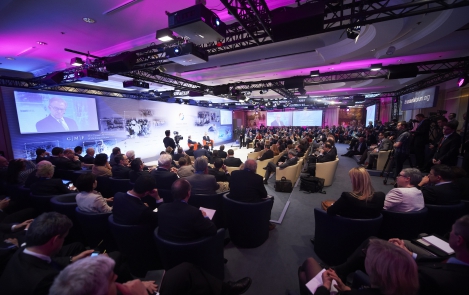-
Reset
+


"Russia to Europe: We can do whatever we want", EUobserver, 22 March 2014
22.03.2014
BY VALENTINA POP
BRUSSELS - Foreign policy debates are usually a polite affair. Ideas may clash, but the exchange rarely gets personal.
This was not the case on Friday (21 March) during the "Brussels Forum", an annual gathering of European and American politicians and experts, including the Russian ambassadors to the EU and Nato.
The Estonian President, Toomas Ilves, complained about the EU "sitting and watching" while Russia annexed Crimea and giving Moscow "a minor slap on the wrist" by blacklisting a few dozen people, a reaction which Russia "laughed at."
The Italian foreign minister, Federica Mogherini, who was defending the EU decisions, snapped: "So let's bomb Russia? What is the solution?"
Ilves retorted: "We should begin defending ourselves, because once you start going in this direction [annexation of territories], what possible intellectual reasoning could say 'this won't continue'?"
The Russian ambassador to the EU, Vladimir Chizhov, defended what he called the Russian "intervention" in Crimea, saying the crisis had started earlier, when Ukraine slipped into "deep political and economic problems" and risked turning into a "failed state."
Ilves said Chizov was being "disingenous," because "you can't destabilise a country and then express concern that it's a failed state."
Mikheil Saakashvili, the former president of Georgia at the time of Russia's last "intervention," its 2008 invasion, said he had "no respect" for Chizov, who reminded him of a character from Dr Strangelove, a Cold War satire directed by Stanley Kubrick in 1964.
On a separate panel, Nato secretary general Anders Fogh Rasmussen cornered the Russian ambassador to Nato, asking why Russia is not respecting the international principle it subscribed to in 1999 - that each country has a right to freely decide on its international alliances.
"This is true, but there is also the international law enshrining the principle of indivisibility of security. Nobody will improve their security at the expense of the security of others. Nato is free to take any decision. And Russia is free to take any decision to protect its legitimate security interest," the Russian ambassador, Alexander Grushko, said.
"From the beginning, we said that if Nato will go on with enlargement, it will continue producing new dividing lines, moving dividing lines towards the Russian borders. We also said that in some cases, these dividing lines will cross inside countries. It's up to you if you listen or not," he added.
Rasmussen continued his grilling: "Would you accept Georgia's right to choose Nato membership if this is a Georgian deision and if Nato accepts that? Would you accept that?"
Grushko replied: "We are against, we believe that this is a huge mistake. This is the position of my country."
The Russian ambassador also said that instead of focusing on "how to show its muscles" militarily, Europe should focus on the rights of Russians in the Baltic states, where hundreds of thousands are denied citizenship "just because they speak Russian."
"I think it would be a better solution than to send US [missile defence] interceptors," he noted.
Meanwhile, senior figures who had dealt with Russian leader Vladimir Putin during their career warned of the consequences of letting him get away with the annexation of Crimea.
With Putin knowing that Nato will not go to war over Ukraine or Georgia because they are not members of the alliance, Former Nato chief Jaap de Hoop Scheffer said Moldova may be next on Putin's list.
"Let's not forget Moldova, because the next stop might really be Transnistria," he said.
The former ambassador of the US to Nato, Kurt Volker, warned that the dismemberment of Ukraine sets a terrible precedent after it unilterally gave up its nuclear arsenal.
"After Russia's incursion in Ukraine, no country will give up nuclear weapons in return for territorial guarantees," Volker said.
In the aftermath of the Soviet Union's collapse, in 1991, the newly independent Ukraine had on its territory the world's third largest nuclear arsenal, larger than those of Britain, France, and China combined.
Five years later, it handed over all its nuclear warheads to Russia for dismantling, after having signed a memorandum in Budapest with the UK, Russia, and the US pledging to respect Ukraine's territorial integrity.
US President Barack Obama did tell Putin he is in violation of this Budapest memorandum. But both Washington and London are excluding the "military option" in reaction to Russia's actions in Ukraine.
Contacts say the furthest they might go is arming the Ukrainian military, which according to its foreign minister, is preparing to defend itself in case of attacks beyond Crimea.
Original article on the EUobserver webpage.



